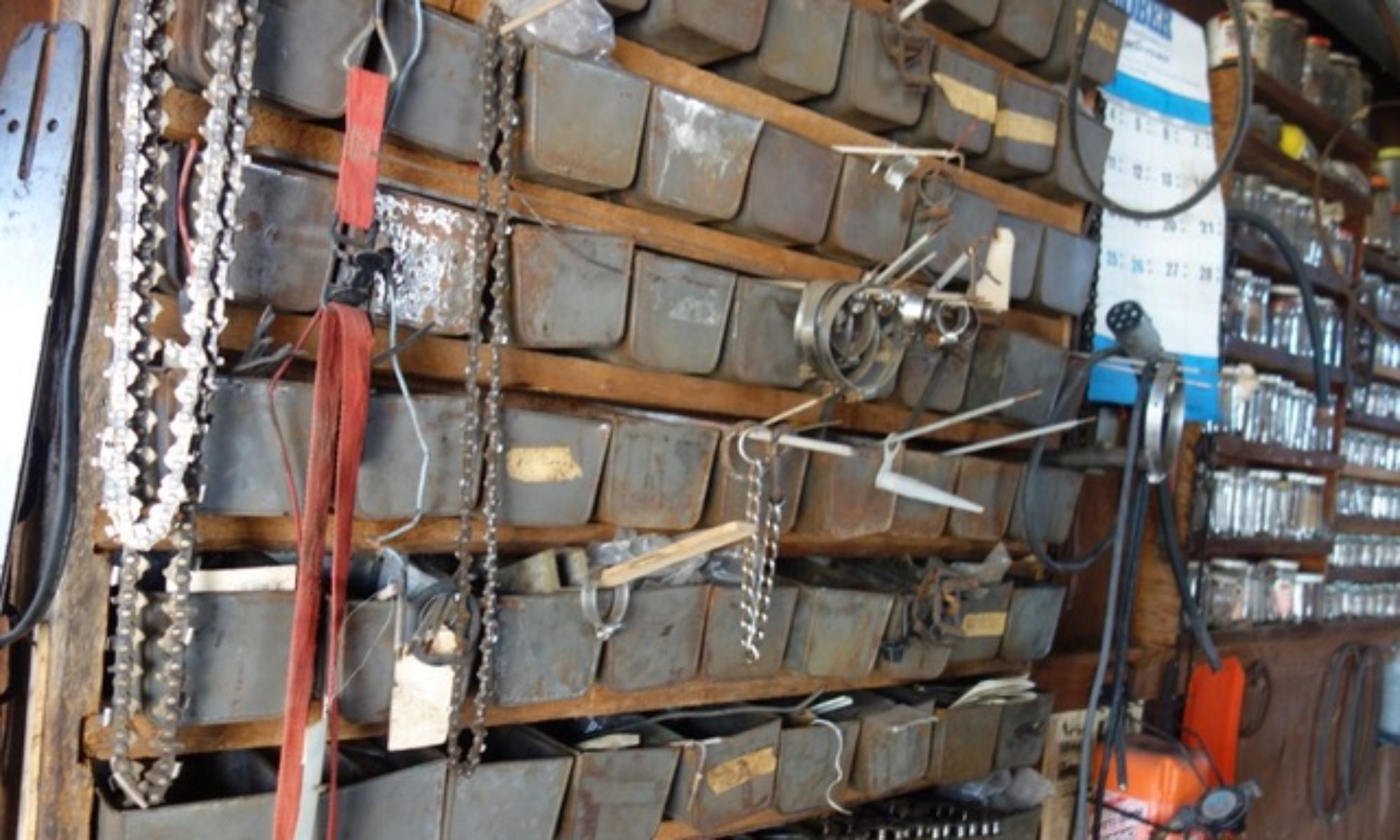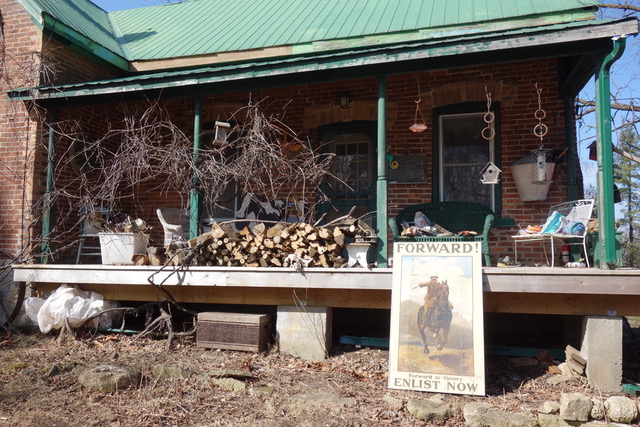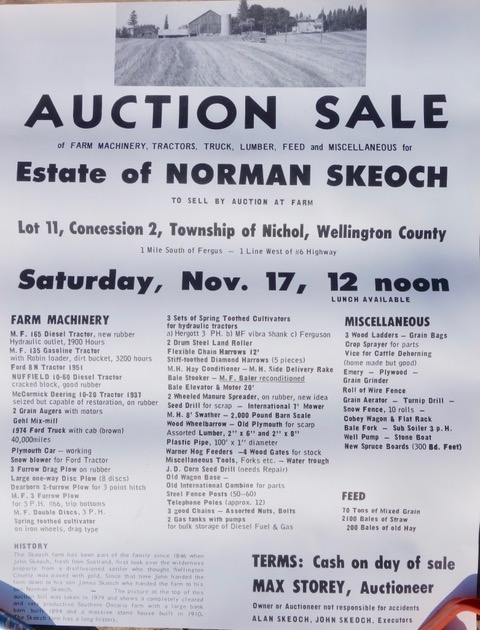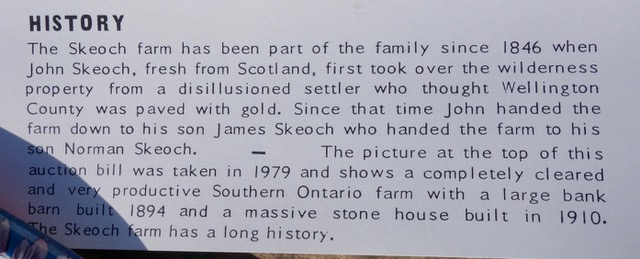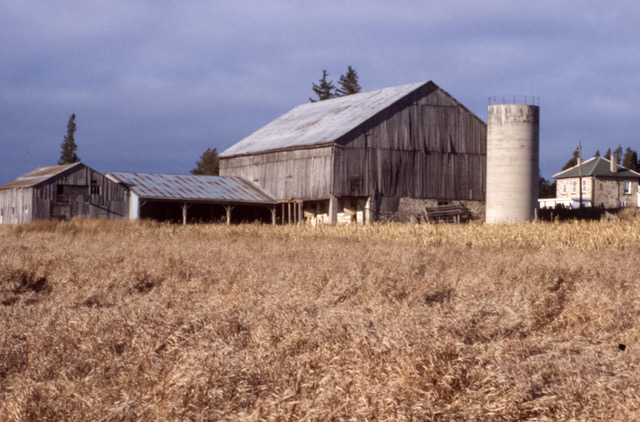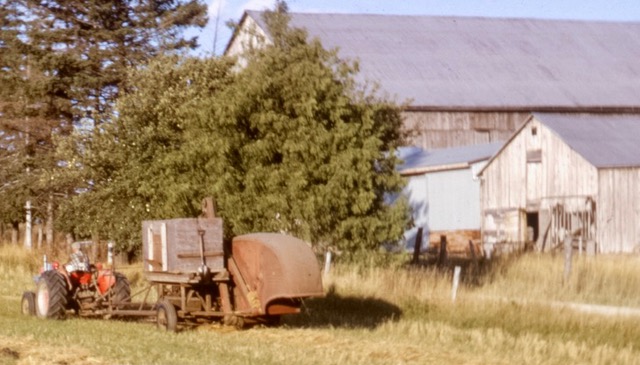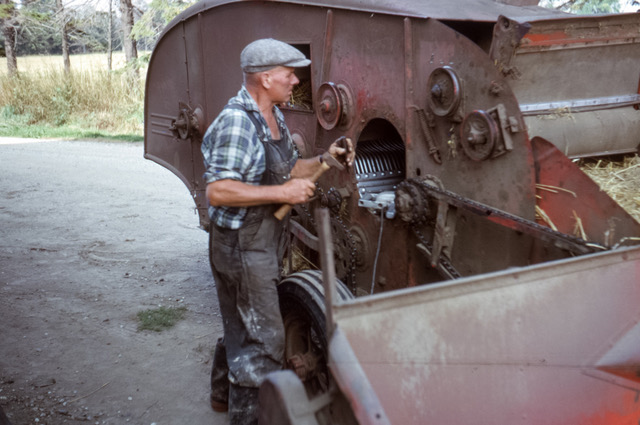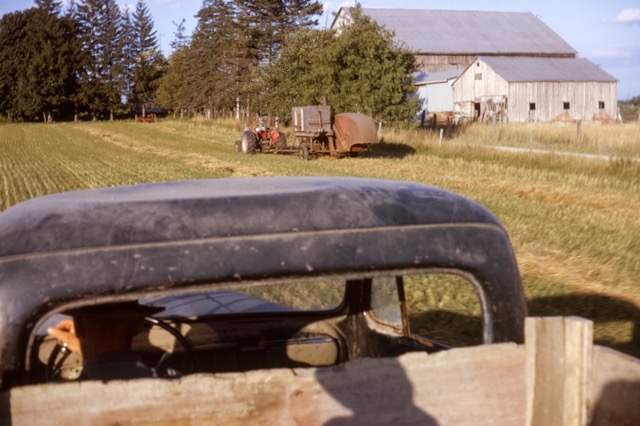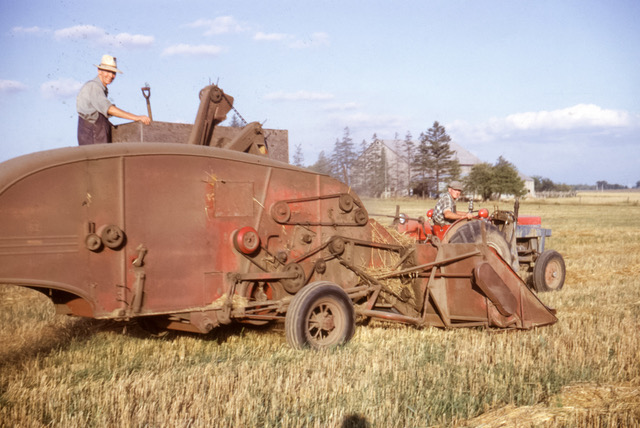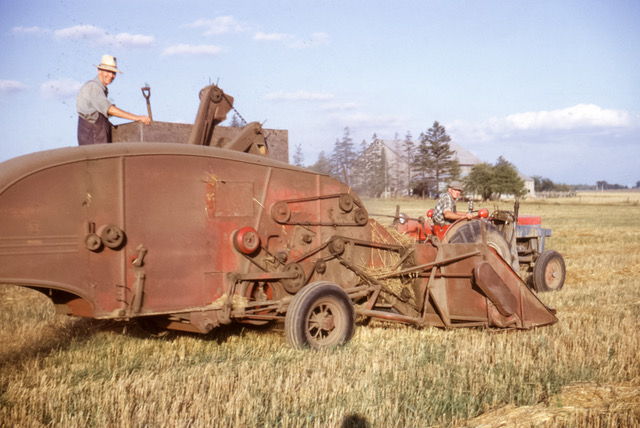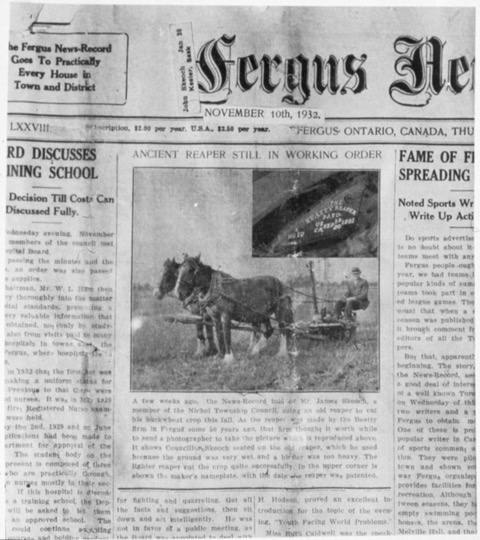EPISODE 175 “GODDAMN ROCK IN THE COMBINE” (BEGINNING OF A SERIES)
alan skeoch
nov. 2020
Begin forwarded message:
From: Alan Skeoch <alan.skeoch@rogers.com>Subject: Skeoch Family…to complement the Auction posterDate: April 13, 2018 at 1:33:04 PM GMT-4To: Karen Wagner <karenw@wellington.ca>
The MASSEY HARRIS COMBINE HARVESTER…FINAL DAY OF ITS LIFE
“ALAN, how would you like to take the Ford tractor and the side delivery rake…turn over the hay in the south field.”
“Love to…”
“Hay got a little damp in the rain…too wet to bail.”
That must have been in the late 1970’s. Uncle Norman (Skeoch) was running the Skeoch farm alone by then. Uncle Archie had
died in the west. Choked to death. Which left Norman alone on the Fergus farm. It was mid summer, beautiful day, smell of growth in
the air coupled with the perfume of new mown hay. A gaggle of guinea hens ran here and there yapping to beat the band.
Uncle Norman surprised me that day. That was the first and only time he ever entrusted me with a farming operation. Hell, I didn’t
even know how to start the tractor let alone guide the side delivery rake accurately down the windowed timothy.
“No problem, just
push the starter and put her in gear. Do it now. I’ve got to work on the combine.”
The combine? Archie and Norman had pooled their resources back in the early 1950’s to buy what was then a brand new Massey Harris combine harvester.
By the late 1970’s it was no longer new. The red paint of its halcyon days had faded to a rusty red hue. The great hulking machine had lost its
novelty. New combines had replaced this one. Huge, self-propelled machines that could consume wheat, oats or barley fields as if they were morning
porridge in a lumber camp.
“Needs some repairs.”
Seemed off to me that Uncle Norman was going to repair the machine with a big ball pain hammer. But what did I know?
So he began hammering as I drove down past the barn to the south field. Elated to be trusted. Determined to ruffle up the wet hay as perfectly as
possible. What a grand afternoon? What a great job? Could I do the turning twice just for the hell of it? Best not. So I returned to
the barn where Uncle Norman was pounding the Massey Harris combine as if it was some enemy in mortal combat.
“Job’s done, Uncle Norman.”
“Harrumph1”
“What’s up?”
“Picked up a son of a bitching rock … bent the goddamn master cylinder.”
“Can it be fixed?”
“Not today and not with this goddamn hammer.”
“Rcck?”
“Yep, still in there…”
“Can it be fixed?”
“Nope…dead…dead as that guinea hen I hit with the mower…damn,damn, damn!”
So, while i was enjoying myself, Uncle Norman was trying in vain to attempt to harvest the oats whose golden tassels were waving in the summer breeze.
“What will you do?”
“Have to get a custom machine in to harvest the oat field. Have to pay for that. Farming can be a losing proposition.”
That comment made me think of another visit to the Skeoch farm. Uncle Norman was in the stable and a big five ton truck
had backed up close to the stable door. A boarding ramp had been lowered. Painted on the side of the truck were
the words “dead and disabled animals, call ….”
“What’s up Uncle Norman?”
“Had to call the dead wagon…heifer in the barn got the bloat…blew up like a goddamn dirigible…dead…alfalfa, I think.”
“Bloat?”
“Happens once in a while with cattle. if I had seen her I could have driven-in the bloat knife right into her gut and let the gas out of her. Happened so goddamn fast
that I couldn’t reach her in time. Now she’s wedged in the barn, blown up…take a look if you want….”
And there she was, Dead as a doornail, lying on her side at the stable door. Huge. Seemed too big for the doorway. Wndered if she
could be deflated somehow but Uncle Norman and the dead wagon man hooked her up with a cable and winch and hauled her
through the door and up into hte back of the truck.
“What happens to her now?”
“Depends how long she’s been dead,” said the dead wagon man. Which was not really a straight answer.
“Dead loss to me, for sure,” responded Uncle Norman.
Farming is a chancy kind of business. Lots of things can and do go wrong. Often. At the time I was young and it never occurred to me
that Uncle Norman’s income from farming must have been a pittance. So small that the loss of a heifer and the loss of the Massey Harris
combine might have pushed him over the edge into near bankruptcy. His expenses were small. For most of his life he was a bachelor
Never travelled much. Couldn’t really because his truck was so badly battered that it raised eyebrows on the road. That condition coupled
with the fact he had four or five dogs as passengers, their heads jockeying to get in the open air from the passenger window. There was no back window
making the truck rather chilly on winter days.
Back to the combine. “Barring! Whump…boom.” Uncle Norman could not dislodge the rock that had been the master cylinder.
Each time he pounded the combine the closer it got to the scrap heap. Finally Uncle Norman gave up and hauled the Massey
to the fencerow of dead machines … a grave yard if you will. The combine would not be lonely for others were abandoned there long the golden rod… a couple of drag plows, a timeless dump rake
and various sections of harrows both spring toothed and straight toothed.
Up a little further in the orchard archaeologists had identified the fragmentary evidence that ancient people…perhaps Neutral aboriginals…had once lived and laboured
on Skeoch land. But that was supposed to be a secret lest souvenir hunters destroy any remaining evidence. Perhaps the Massey Harris combine was about to be discarded
on top of a long forgotten First Nation fire pit. No matter. All dead and forgotten.
So, on that summer day, I drove down the laneway feeling both exhilaration and depression. Uncle Norman had tried to cheer me up with his usual offer of a bottle of beer
from a case hidden in the cattle rubbed manger. “Thanks anyway, got to head back…thanks for the job turning hay…loved it.”
Norman’s figure receded as I bumped down the long lane passing the pig barn on the way. Pigs seemed to pay well and Uncle Norman had several big fat brood sows
with their tiny piglets rooting around the bedding straw. I could see Uncle Norman in the rear view mirror. He was slaking his thirst with a brown bottle of Molson’s Golden Ale.
All was not lost obviously.
That was the last time I remember seeing him alive. He died in 1979 and when his Safety Box was opened and the will read I got a big surprise. My cousin John Skeoch…long John Skeoch…and I
were named as executors in the will … not as recipients but executors. We had to carry out Norman’s wishes. He left the farm to his brothers and sisters and their families. Holy Smoke!
That meant one unpleasant task was placed in our hands. We had to sell the farm. How else could the farm and its contents be divided? It had to be converted to cash and then divided
equally as possible to the families of Lena, Elizabeth, Greta, Archie, Arnold, Arthur and John. And, in the cases where some had pre deceased Norman then that share had to be further
subdivided. This was going to be messy.
To make it simple. Our job was to convert the farm into cash and then divided the cash among all the surviving relatives. We did the best we could.
Today, in April 2018, one memory of that ‘executing the will’ ordeal stands out in my mind. Yes, correct. You guessed it. That Massey-Harris combine harvester.Who owned it? Was it Uncle Norman’s? Or Uncle Archie’s? Well, it belonged to both of them. So in order to avoid family squabbles we decided that whatever we got from the machine
at the auction then that amount would not be divided up but go directly to Uncle Archies surviving family members. Seemed wise at the time. But wasn’t.“Next is this Massey Harris combine harvester. Not running right nowso you are buying it as is. Open bid?”Silence. No bidding. Eventually the scrap man bid around $40 for the machine…might be worth $100 in the scrap yard but it would cost quite a bit to get it there.The $40 satisfied no one. We would have been wiser to have avoided trying to be nice guys. Got us only anger. Being executors in a will where there are manypeople to satisfy is not easy. And sometimes things being sold have higher emotional value than market value. Some relatives stopped talking to us after the sale was over.To avoid this kind of dispute I did what I thought was an honourable thing. Uncle Norman had given me the cast iron pot used in pig slaughtering or alternatively used toboil maple sap into maple syrup A huge thing bigger than a bathtub. To avoid trouble I returned it to the farm auction and was resolved to buy it back at whateverprice. Bidding was spirited I won but nearly damn well broke. That honourable effort got me no praise. Instead the men from the Fergus Legion got really angry with me.“Norman brings this cauldron to our corn roasts every year…has done so for decades. It’s ours”“Then why not bid for it?”“Who do you think was bidding against you…that was our man.”“Why did he stop>”“Price went too high. But that is our pot…need it for the corn roast.”I said nothing but just loaded it into our truck. Seemed being honourable was not a good idea.
WHERE IS THIS STORY GOING?
Strange thing happened that day. Somehow that bashed up and broken Massey Harris combine harvester
became lodged in my mind. Events followed culminating in my M.A, thesis at the University of Toronto on machine
design. Sounds boring! Right it does sound boring but stick with me. The story is goddamn interesting. Have you
ever heard of Patrick Bell? Cyrus McCormick? The Massey Family? Well, more by fluke than design my life
changed when that “goddman rock” bent the master cylinder of Uncle Norman’s 1953 Combine Harvester.
After his death, my cousin John and I had the unhappy job of getting the auctioneer Max Storey to sell off
Norman’s possessions. The Massey Harris combine sold for $40 or so and went to the local scrap yard.
I should have bought the machine. It became that important to me as you will read shortly.
alan skeoch
Nov. 2020
